The Right To Know Where Your Child Is During Visitation
Parents often worry about their children when they're away — even if they're just visiting the other parent. You may wonder if you have the right to know where your child is during visitation for a number of reasons. Maybe your ex frequently drops your child off late or you suspect they'll take the child without your permission.
On the other hand, you may have legitimate reasons for not wanting reveal your child's location. Maybe it's difficult to communicate calmly with your ex or unsafe for them to know where you live. Plan so you always know where your child is without negatively impacting your relationship with the other parent.
Do I have the right to know where my child is during visitation?
You only have this right if your custody order specifies that parents must disclose the child's whereabouts. Refusing to reveal the child's location would be a violation of the order.
To add this requirement to an existing order, you and your ex could agree to modify your parenting plan or you could ask the court to make the change if one parent doesn't want to include it.
If you don't have a custody order, the other parent doesn't have to tell you where your child is during their visits. In some cases, they could legally take the child out of the state or country without your permission. That's why it's so important to get a custody order.
To get an order, you'll need to follow your state's process for getting a custody order or try an alternative dispute resolution method to reach a custody agreement with the other parent.
What can I do to figure out my child's location?
You can contact the other parent while your child is visiting them, but they aren't obligated to tell you where they are unless you have a court order that requires them to.
Some parents call the police but this is not recommended. It could cause a rift in the parenting relationship and make the child feel unsafe as they might suspect something is wrong.
Instead, try to have a conversation with the other parent about why it's important for both of you to know where the child is during your respective visitation time (e.g., in case of an emergency).
Reaching out directly to the parent might not be a viable option if you're dealing with a verbally abusive or narcissistic parent or if your dynamics feel toxic. If the parent isn't cooperative, consider going to court.
Should I track my child's location?
It can be tempting to track your child so you know where they are at all times. Smartphones and smart watches come with built-in location tracking capabilities, and there are apps specifically for parents who want to track their kids' location.
It's wrong to track someone without them knowing. You should tell your child and the other parent beforehand since you're essentially tracking the parent, too, whenever they're with the child. If they don't want you to do it, listen to their concerns and try to compromise on another way to stay in the loop.
Pros and cons of tracking your child's location
Pros
- It allows you to make sure your child is safe, soothing your anxiety.
- You don't have to contact the other parent.
- If you let the child monitor your location as well, it can help them feel more connected to you. This can be especially helpful to young children who are just beginning to visit the parent they spend less time with.
- If there's an emergency, you'll know exactly where your child is so you can get to them or send help.
Cons
- The other parent or your child (specifically if they're a teenager) may feel you're distrustful of them, which can damage your relationship. If tracking becomes a form of discipline or the reason why a child is grounded, for example, it could deepen the distrust.
- It could heighten your anxiety, especially if the app isn't working properly, as you may become fixated on knowing where your child is at all times.
- Your child may adopt your anxieties as they may wonder what dangers are out there that make you feel it's necessary to track them.
- It can make it harder for your child to be independent as they may feel like they're on a schedule they have no say in.
What can I do if I don't want to reveal my child's location?
There could be many reasons why you don't want to tell your ex where you and your child are. Maybe they were abusive toward you or your child or they've tried to prevent visits in the past and may try to take the child during your visit.
If it's safe for you to speak with them, try to address things civilly. You don't have to specifically say where you are but just let them know the child is safe. Consider letting them speak to the child so they're not as worried.
If it's not safe for you to communicate, you can ask the court to intervene. You might be able to conceal your address from your ex or get protection orders that prevent them from contacting you.
The other parent may not present any threat to you or your child, but their constant calling or texting might interfere with you spending time with your child. You could try to reach an agreement on limiting contact in your parenting plan.
Do I have a say in who my ex brings around my child?
You don't have a say in who the parent brings around your child unless you have a court order stating otherwise. If the person doesn't pose a safety risk, you shouldn't restrict the child from visiting the other parent.
Inform the court immediately if someone who's around your child presents a threat to your child's well-being. You might be able to get an emergency order to protect your child. Contact the police if you suspect criminal behavior.
How can I plan ahead so I know where my child is?
It's pivotal that you have a visitation schedule suitable for both parents and the child. Without one, there's no structure in regards to who will have the child at specific times which can lead to arguments. You can look at popular schedules in your state for inspiration.
In addition, to ensure you have the right to know where your child is during visitation, include related terms in your parenting plan. You could easily add these details using a parenting app like Custody X Change.
Negotiating a parenting plan with the other parent is your best chance to get these terms. If you can't reach an agreement, you could provide the court with a proposed parenting plan that includes the provisions you want to see.
In either case, the judge ultimately decides what will be part of the final custody order. Whether the judge approves your plan depends on if they believe the terms are in the child's best interest.
Consider the following provisions when making or modifying your parenting plan.
Disclosure of the child's location
Include language that says each parent is responsible for keeping one another updated on where the child is during their visitation time.
Specify how parents can contact one another and how the parent can contact the child during visits. This can include methods of communication (phone calls, texts, email) and times when contact is allowed.
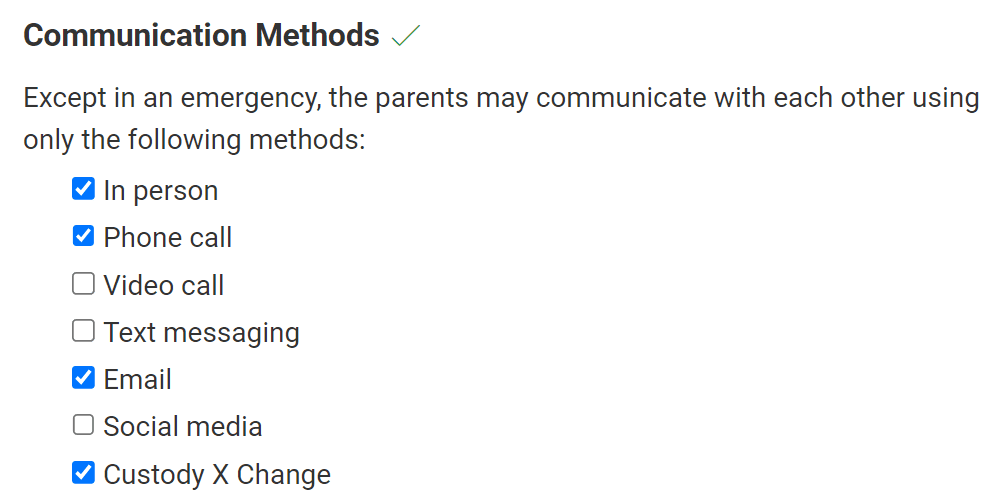 Try this with Custody X Change.
Try this with Custody X Change.
If you don't get along well or want to document your conversations, you might consider restricting parent-to-parent communication to an online messaging software. You could print out these conversations and use them in court if need be.
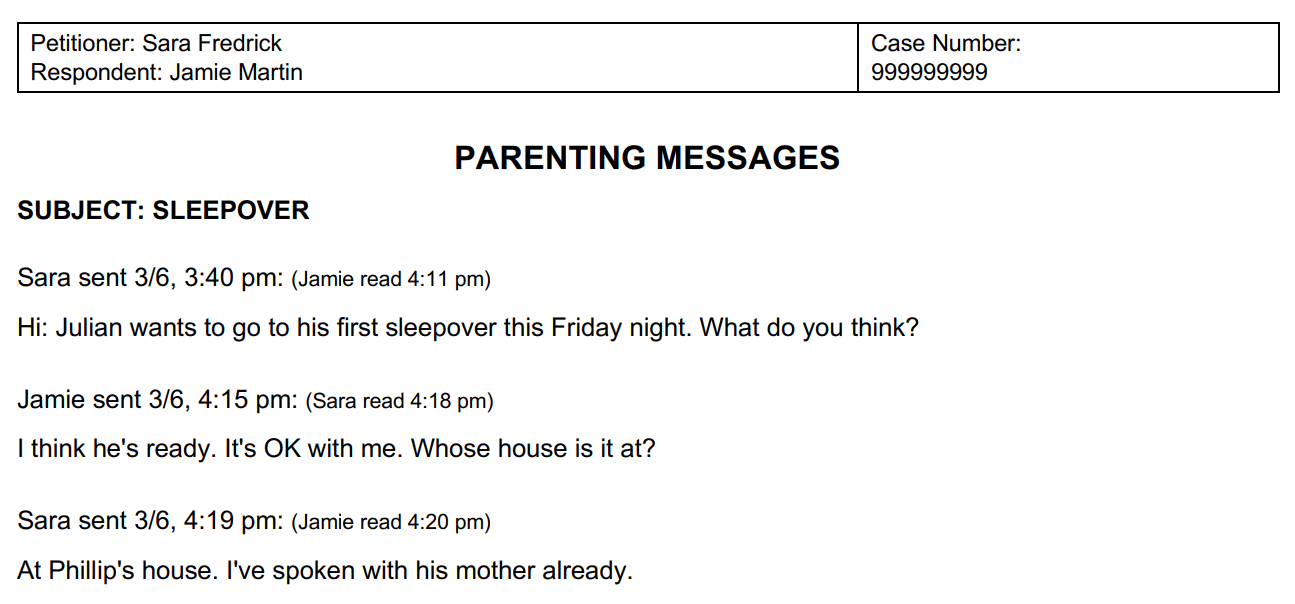
Exchanges
An exchange is when a parent picks up their child from the other parent or drops them off. Adding specific rules for exchanges like what you'll do when a parent is late will bolster your schedule's effectiveness.
Using Custody X Change, you could keep track of whenever the other parent picks up or drops off the child late. You could print a report that shows how it affects parenting time, which can be used as evidence in case you need to go to court.
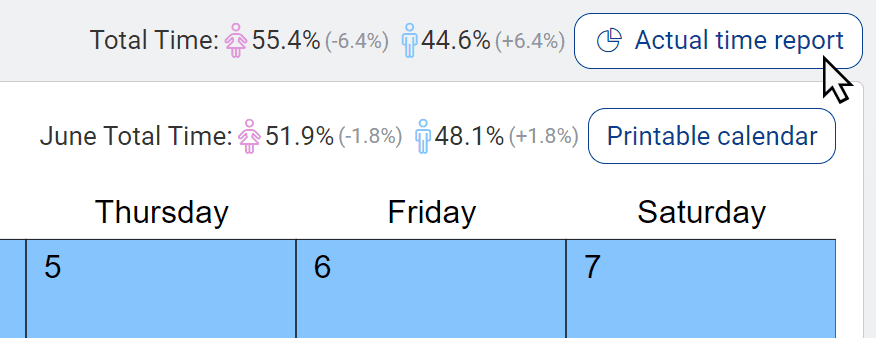
You don't have to allow anyone besides the child's other parent to pick up your child. Specify in your plan whether anyone besides parents can pick up your child for visits.
Also, consider supervised exchanges if there are safety issues or parents are likely to clash when they see each other. This would require a neutral third party at the exchanges or parents to meet in a public location and exchange the child there.
Supervised visitation
If it's not safe for the child to be alone with a parent, supervised visitation is necessary. This could prevent the other parent from taking the child somewhere without your permission. If approved by the court, a third party will monitor all visits or visits will take place in a supervised visitation facility.
New relationships
A big point of contention is the role of parents' new partners in the child's life. In your parenting plan, specify if there's anyone who the child isn't allowed to be around, whether significant others can spend the night, rules regarding others living within the household, etc.
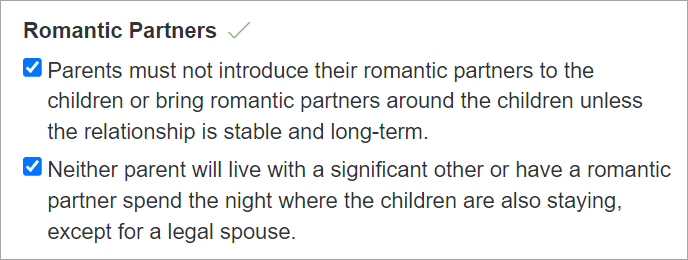
Consider specifying a minimum amount of time the partner must be with the parent before they're introduced to the child, and that the parent must meet the partner before the child does.
The other parent might be hesitant to agree to this term out of worry you'll try to pry into their personal life. If this is your intention, then you're going about it wrong. These provisions are meant to protect the child and should be beneficial to both parents.
Contact information
If there aren't any safety risks, parents should have one another's home and email addresses and phone numbers. This can help parents stay up-to-date on the child's whereabouts in case of emergency and share important information.
You may also want to have the contact information of relatives, the parents of your child's friends, the child's school, etc.
Activities
It's a good idea to require each parent to calendar your child's activities to make sure there's no overlap with either parent's scheduled time, and show where the child will be at specific times.
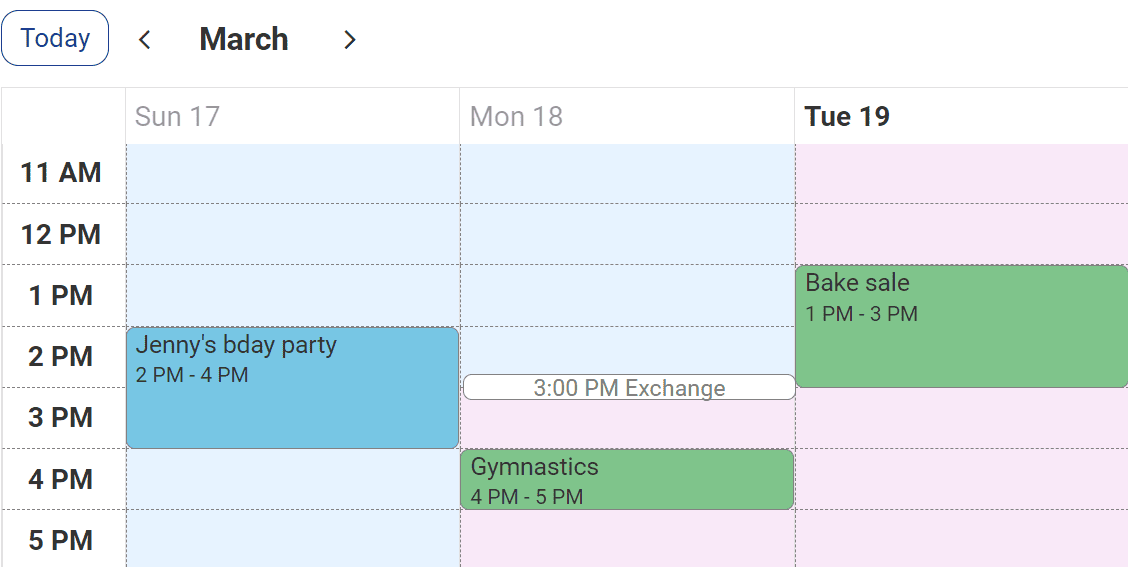
Travel and vacations
Set boundaries on where parents can take the child to prevent unapproved long-distance travel. Require that each parent notify the other within a certain time frame before leaving, and specify that the trip cannot interfere with the other parent's visitation time.
If you have a custody order and the other parent takes your child without permission, it could be considered parental kidnapping.
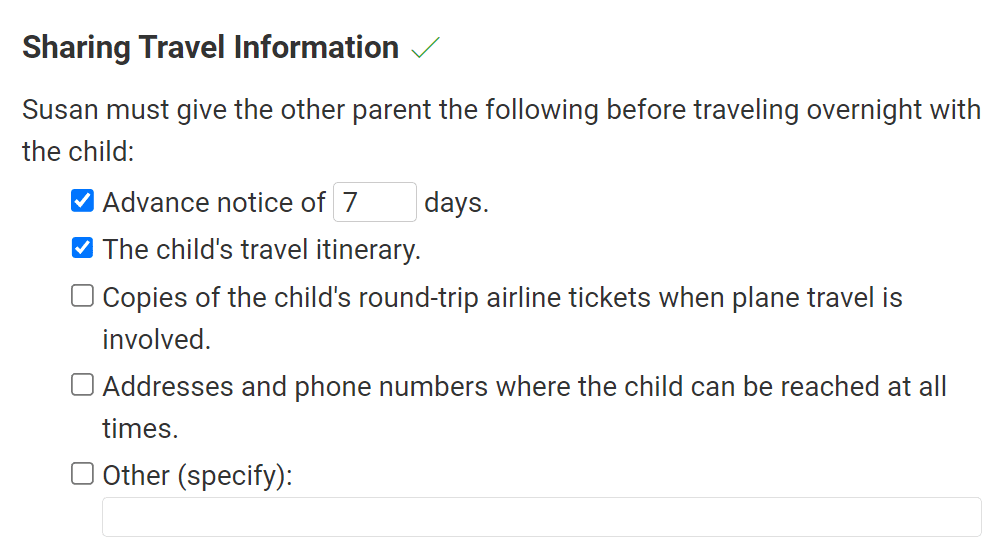
How can Custody X Change help my situation?
The Custody X Change app has many features that can help you figure out how to handle all things related to knowing where your child is during visits.
- Create a detailed parenting plan that spells out how you'll handle disclosing the child's location in airtight legal language.
- Message the other parent to inquire about the child's whereabouts.
- Calculate your visitation timeshare calculation in case of schedule interference.
- Print documents including actual time and messages reports in case you need to go to court.
- Keep a custody journal noting any difficulties you've had with the other parent or keep notes regarding data collected from any location tracking software you use.
Custody X Change makes it easier to handle all the moving parts of custody.
